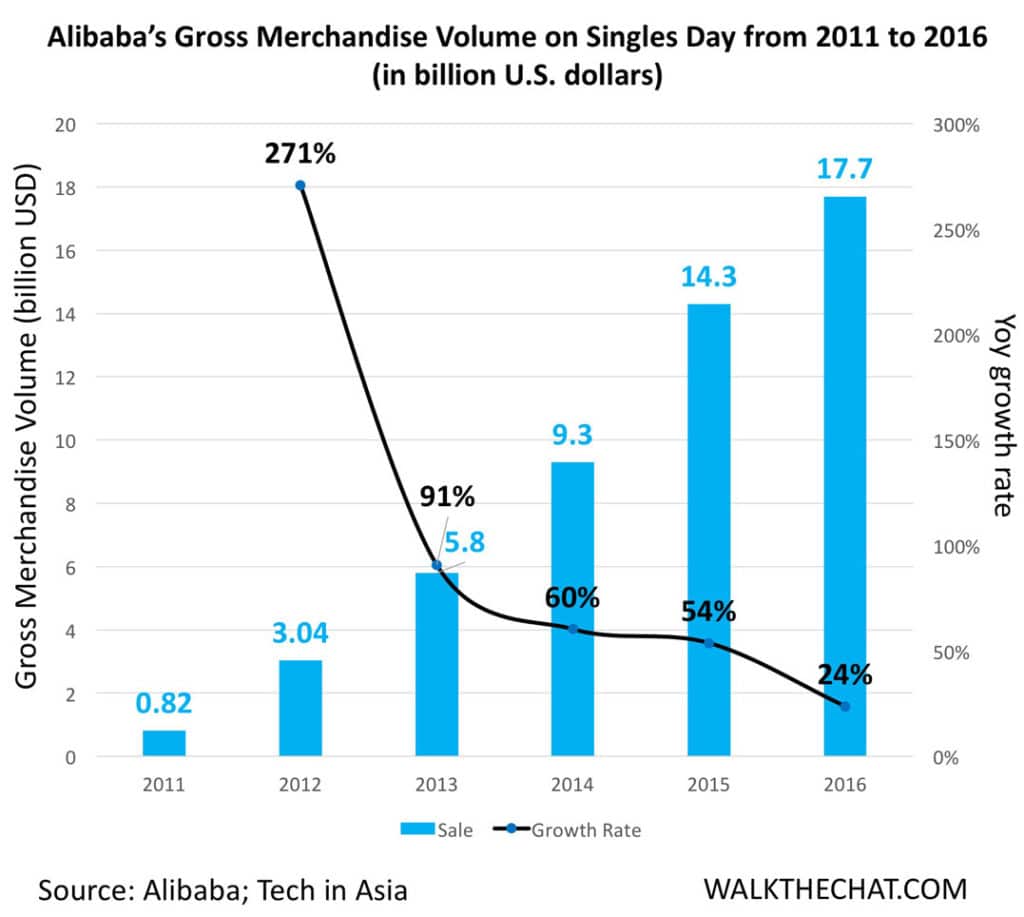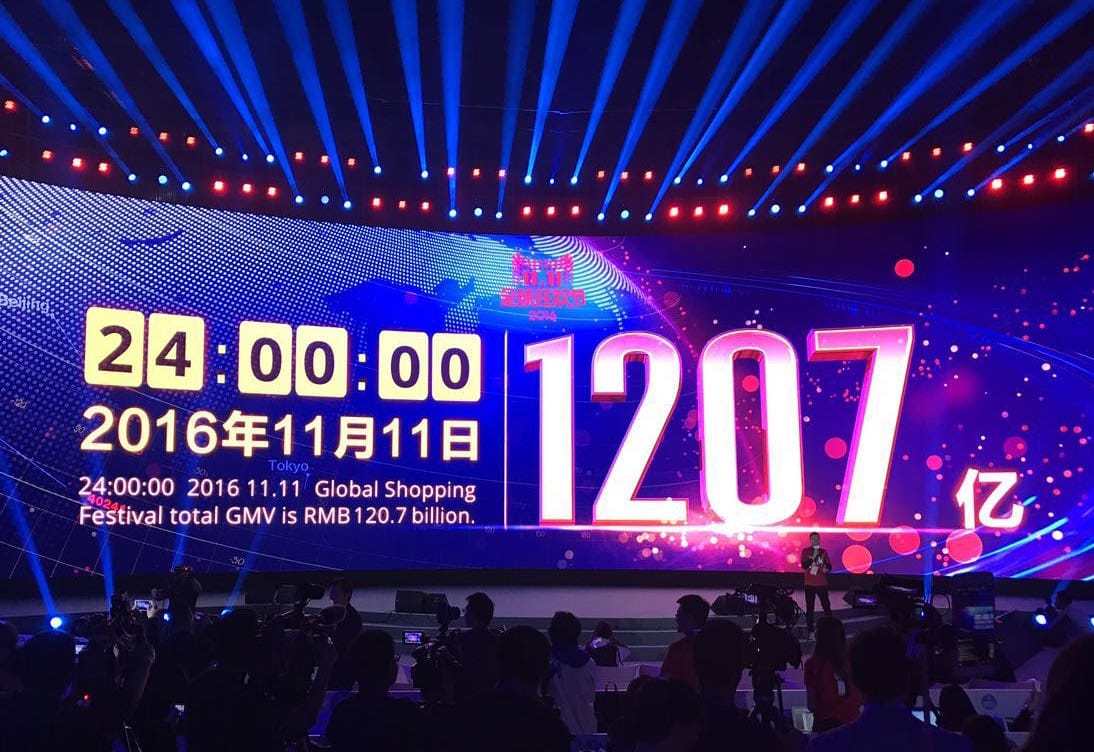Single’s Day is over, money’s been spent, your boxes are on their way. Now it’s data analytics time!
As a Single’s Day tradition, Alibaba displays the realtime shopping data on a large screen as part of the celebration. No surprise: it’s another record breaking year.
52 seconds, 1 billion RMB
6 minute 58 seconds, 10 billion RMB
2 hours 30 minuts, 50 billion RMB
18 hours 55 minutes, 100 billion RMB
22 hours 12 minutes, 111.1 billion RMB
24 hours, 120.7 billion
That’s $17.73 billion sales in one day!
(Measured in Gross Merchandise Value)

Other interesting statistics:
- 81.87% transaction happened on mobile devices
- Users from 235 countries participated in this shopping festival
- International transaction increased 60% compared with 2015; among which, 48% comes from Russia; followed by Spain, Ukraine, Israel and France.
- The first parcel shipping took merely 13 minutes; first cross-border parcel sale took 28 minutes to be delivered (including the time for custom clearance)
While the numbers show it’s another record breaking year for Alibaba, let’s take a closer look.
Top cities for shopping do not change much from last year
- Guangdong; 2. Zhejiang; 3. Jiangsu; 4. Shanghai; 5. Beijing
Traditional brands takes over the top best selling stores
In the past years, Taobao stores (usually with only online presence) tended to take the top selling ranks. This year, more traditional brands are ranked top selling. Top selling brands rank as follow:
- Suning; 2. Xiaomi; 3. Rongyao; 4. Haier; 5. Uniqlo; 6. Nike; 7. Meizu; 8. Three squirrels; 9. Midea; 10. Adidas; 11. New Balance; 12. Semir; 13. Gree; 14. PurCotton; 15. GXG; 16. Ecovacs; 17. GAP; 18. Balabala; 19. PeaceBird; 20. Little Swan
Growth slows
The final number markets a 24% increase from 2015’s number, but it is significant lower than the previous growth rate of 54% for year 2015, and 60% for year 2014.

Part of the explanation is the slow down of the smart phone market growth. Alibaba is reaching its penetration limit and had less first-time participants who really drive sales growth.
E-commerce market is also getting more mature. More consumers are viewing Single’s Day as a routine shopping holiday. Thus we are seeing less enthusiasm on social media in general, and less shoppers going wild on spending.
More competition
As Single’s Day becomes more like a “national holiday”, it is no longer an Alibaba’s one-man-show.
- JD.COM’s sale saw a 78% increase from 2015.
- Suning had a 193% increase of sales compared with 2015. A total of 372k products were sold on the platform
- Guomei recorded 200 million RMB in sales, 10 times the amount of 2015.
More technology involved
Alibaba launched a VR campaign to kick off the Single’s Day sale. Although technology is still at an early stage, VR technoloy could have some real impact next year. For now, the actual impact of the VR campaign on sales is questionable.
Live stream
Almost all the e-commerce platform used KOLs to do live streaming and encourage of sales. That’s not a surprise since 45.8% of Chinese Internet users watch live streams, according to a study conducted by CNNIC in June 2016. Live streaming also tends to drive high purchase conversions.
Richard Liu, CEO of JD.COM, did a live streaming for cooking chicken and Boston lobsters to sell premium food.

Guomei’s CEO did a live streaming video to send out red envelopes. Jumbo’s CEO did a live streaming to give out a Mini Cooper.
Lili&Beauty, a Taobao cosmetics brand, spent a hefty 22 million fee to invite the top Internet celebrity Papi Jiang to do a live streaming on Single’s Day. This live streaming attracted 1.5 million view. Estimated sales from this live streaming are 1 billion RMB.

Of course Tencent didn’t miss the live streaming show. November 11th happenned to be Tencent’s 18th birthday. Tencent CEO Ponny Ma and other top executives did a live streaming and gave away 300 Tencent stocks to each employees to celebrate the company’s birthday. The total monetary value of these stocks nets to 1.5 billion RMB! In addition, Pony Ma also distributed RMB 300 million cash in red envelopes.

Longer promotion period
Everyone is shouting for attention during the crazy 24-hour shopping craze. This year, platforms tried to drive users’ attention to pre-sales which are less competitive.
Tmall’s promotion began one month in advance in the form of a pre-sale. The customers could pay a small deposit to secure the privilege to purchase products a littler earlier than everyone else.
For JD.com, the promotion lasted for 10 days, starting from November 1st and ended on November 11th.
Alibaba was under high pressure to over perform
As stackholders and medias expected another record breaking day, Alibaba was under high pressure to perform well. Thus it put a heavy pressure on its merchants.
According to Tmall Single’s Day policy, merchants can only participates in Single’s Day sales if they list a price that is below 90% of the lowest selling price between Sep 15th to Nov 10th. This policy pushed merchants to list a high price during the prior month.
To maintain its sales volume, Alibaba had a secrete weapon: WeChat coupon groups. Alibaba runs more than 1,000 WeChat groups that constantly distribute coupons. These are secrete coupons that gave a huge discount on those products that listed a “higher than usual” price.

Photo credit: Made for Goods
Of course, these coupons, and the Single’s day in general, are just playing the numbers game. Because merchants increased their prices in anticipation for the Single’s day, consumers are not getting a real discount. And merchants are still slashing their margins, often making negative margins during the festival.
Alibaba spent a lot of resources in organizing merchants and consumers to participate in this game. If Alibaba keeps focusing only on a pretty sales number and disregard margins and customer experience, Single’s Day might becomes a burden and eventurally harm the company.
A shift to international market
This year, Alibaba tried to generate growth from the international market. The cross-border shopping theme of the VR campaign is a perfect illustration of this shift of focus. Although Alibaba did not release the actual percentage of the cross-border sales volume, custom clearance office in Guangzhou and Huangzhou reported a record breaking traffic volume.
For cross-border platforms, Singles day is an appetizer; Black Friday is the real main course. JD Global started the Black Friday promotions on the day after Single’s Day.
Conclusion
It’s another record breaking Single’s Day for Alibaba. As consumers mature, and China’s economic growth stabilizes, the crazy growth will not continue for long. Merchants need to have a more comprehensive year-long plan for promotion while leveraging the shopping demand from nation-wide holiday as a PR opportunity.
Sources: GeekPark.net; Made for goods; Alibaba; Tencent, 36Kr, WalktheChat analysis

